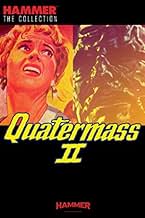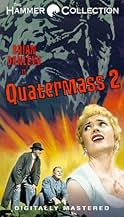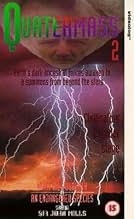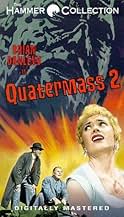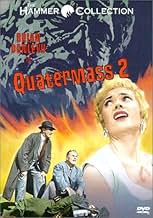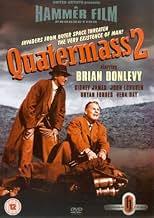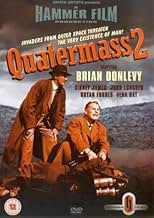IMDb रेटिंग
6.7/10
5.1 हज़ार
आपकी रेटिंग
प्रोफेसर क्वाटरमास, अपने चंद्र उपनिवेशीकरण परियोजना के लिए समर्थन इकट्ठा करने की कोशिश कर रहे हैं, जो रहस्यमय निशान से चिंतित हैं जो दिखाई दे रहे हैं।प्रोफेसर क्वाटरमास, अपने चंद्र उपनिवेशीकरण परियोजना के लिए समर्थन इकट्ठा करने की कोशिश कर रहे हैं, जो रहस्यमय निशान से चिंतित हैं जो दिखाई दे रहे हैं।प्रोफेसर क्वाटरमास, अपने चंद्र उपनिवेशीकरण परियोजना के लिए समर्थन इकट्ठा करने की कोशिश कर रहे हैं, जो रहस्यमय निशान से चिंतित हैं जो दिखाई दे रहे हैं।
John Longden
- Lomax
- (as John Longdon)
Sidney James
- Jimmy Hall
- (as Sydney James)
फ़ीचर्ड समीक्षाएं
I was never aware that this movie was anything other than a stand-alone feature. I'm not familiar with 'Quatermass' in any way whatsoever. But I saw a movie when I was a kid that was titled 'Enemy From Space' and I've never forgotten it. The scene where a man who has been covered in some black stuff shockingly, jarringly shrieks out and stumbles down the outside stairway of some huge, weird, vat-like structure frightened me enormously. I didn't know what the stuff was exactly, I just knew it was burning the man horribly and his utterly convincing screams drove it into my brain permanently.
I was pretty young when I saw it at my local 'B-Movies Only' neighborhood theater. I'm not sure how it was elsewhere, but in my hometown there was a movie house that got all the A-List pictures (Cary Grant, James Stewart, Liz Taylor, Disney) and another that made the most of the plentiful supply of small-budget monster movies that were released in the late fifties and very early sixties. Triple Features were often offered in these 'lesser' venues. The beauty of it was that both types of theater thrived in those cable-less, vcr-less days. But I digress.
So I see this movie and I'm only about 7 years old at the time and that night I couldn't sleep. And though I had sat through the entire thing, my mind was locked into that horrifying scene so completely that I did not really recall another word spoken in the film. It came around to the Biltmore a couple more times and, though terrified, I was irresistibly drawn to see it again, each time absorbing a little more of the content. The challenging storyline wasn't all that easy to grasp - a lot of it went over my young head.
It was a long time ago but I remember a meteorite falling through a roof, a road that went nowhere, a silent and sinister industrial area, a man who becomes suddenly very sick (in the pub I think) and has a white splotch on his face, severely serious soldiers who seem to be bad guys, a window through which an alien something-or-other is observed and, of course, the unfortunate man covered in burning black oil.
A truly eerie movie, as engrossing as it is chilling. I would very much like to see it again
I was pretty young when I saw it at my local 'B-Movies Only' neighborhood theater. I'm not sure how it was elsewhere, but in my hometown there was a movie house that got all the A-List pictures (Cary Grant, James Stewart, Liz Taylor, Disney) and another that made the most of the plentiful supply of small-budget monster movies that were released in the late fifties and very early sixties. Triple Features were often offered in these 'lesser' venues. The beauty of it was that both types of theater thrived in those cable-less, vcr-less days. But I digress.
So I see this movie and I'm only about 7 years old at the time and that night I couldn't sleep. And though I had sat through the entire thing, my mind was locked into that horrifying scene so completely that I did not really recall another word spoken in the film. It came around to the Biltmore a couple more times and, though terrified, I was irresistibly drawn to see it again, each time absorbing a little more of the content. The challenging storyline wasn't all that easy to grasp - a lot of it went over my young head.
It was a long time ago but I remember a meteorite falling through a roof, a road that went nowhere, a silent and sinister industrial area, a man who becomes suddenly very sick (in the pub I think) and has a white splotch on his face, severely serious soldiers who seem to be bad guys, a window through which an alien something-or-other is observed and, of course, the unfortunate man covered in burning black oil.
A truly eerie movie, as engrossing as it is chilling. I would very much like to see it again
This film was actually the first sequel to use a number in the title (although it's American title was "Enemy from Space"). Not only was this a cleverly written film, based on Nigel Kneale's screenplay, but it was a cruel satire on English and American culture in the 1950s.
In a nutshell, Professor Bernard Quatermass, leader of England's rocket group, is at wit's end trying to get more funding for his projected moon project. The British government decides it has "projects of far greater importance.'' At the same time, workers at Quatermass' base detect scores of what look like meteorites falling close by. When Quatermass investigates, he not only finds remnants of the meteorites, but his moon base, conveniently appropriated by an unknown government entity. His lab assistant picks up one of the meteorites and it explodes in his face, immediately infecting him with an alien parasite.
Quatermass is forced to go it almost alone, helped by a cynical police inspector, a drunken beat reporter and a vigilant member of parliament who can't get even his own party members to question where millions of pounds of tax dollars are going to.
The cruel satire comes from the comparison of Western governments of the 1950s to the communist governments they vehemently opposed during the Cold War years. British citizens were taught to implicitly trust government even as it spent millions to unknowingly fund an alien invasion. Civilian workers were so glad to have jobs they don't question why the supposed "synthetic food" plant they're building needs huge doses of toxic gases like ammonia. Even when evidence of wrongdoing is brought up, government red tape squelches it.
As for the movie itself, it is much better written than the original ("The Quatermass Experiment"). Nigel Kneale softens Quatermass' dour and brusk personality. Director Val Guest effectively uses a string musical score to build a creepy atmosphere. He and Kneale even overcome the first movie's dull ending, which had an alien getting electrocuted with no suspense whatsoever. Here, the plant workers, angry that one of their own is carted away by infected security guards at gunpoint, try to storm the plant, turning the aliens' carefully planned invasion on its ear. The irony, of course, is that the plant was conceived because government bureaucracy kept it secret. Now, as the plant is threatened, the same secrecy prevents the aliens from calling for help from the police or armed forces.
The special effects are better in this film, though the giant aliens at the end are not as convincing as they could be. Still, the film is a great example of British science fiction, which relied more on plot and characterization than the special effects that dominated American science fiction.
In a nutshell, Professor Bernard Quatermass, leader of England's rocket group, is at wit's end trying to get more funding for his projected moon project. The British government decides it has "projects of far greater importance.'' At the same time, workers at Quatermass' base detect scores of what look like meteorites falling close by. When Quatermass investigates, he not only finds remnants of the meteorites, but his moon base, conveniently appropriated by an unknown government entity. His lab assistant picks up one of the meteorites and it explodes in his face, immediately infecting him with an alien parasite.
Quatermass is forced to go it almost alone, helped by a cynical police inspector, a drunken beat reporter and a vigilant member of parliament who can't get even his own party members to question where millions of pounds of tax dollars are going to.
The cruel satire comes from the comparison of Western governments of the 1950s to the communist governments they vehemently opposed during the Cold War years. British citizens were taught to implicitly trust government even as it spent millions to unknowingly fund an alien invasion. Civilian workers were so glad to have jobs they don't question why the supposed "synthetic food" plant they're building needs huge doses of toxic gases like ammonia. Even when evidence of wrongdoing is brought up, government red tape squelches it.
As for the movie itself, it is much better written than the original ("The Quatermass Experiment"). Nigel Kneale softens Quatermass' dour and brusk personality. Director Val Guest effectively uses a string musical score to build a creepy atmosphere. He and Kneale even overcome the first movie's dull ending, which had an alien getting electrocuted with no suspense whatsoever. Here, the plant workers, angry that one of their own is carted away by infected security guards at gunpoint, try to storm the plant, turning the aliens' carefully planned invasion on its ear. The irony, of course, is that the plant was conceived because government bureaucracy kept it secret. Now, as the plant is threatened, the same secrecy prevents the aliens from calling for help from the police or armed forces.
The special effects are better in this film, though the giant aliens at the end are not as convincing as they could be. Still, the film is a great example of British science fiction, which relied more on plot and characterization than the special effects that dominated American science fiction.
This movie sees Brian Donleavy reprise the role of Bernard Quatermass,who when the movie opens is not a happy man,the British government having turned down his plans for a Moon colony.Distraction arrives in the form of objects from outer space landing in northern England .On going to investigate he finds a site looking more than a little like the moon project mock up,and to complicate matters his assistant(played by future author/director Bryan Forbes,then in his stalwart character actor mode)is stricken by on coming into contact with the alien substance and is carted away by the guards on the project
Quatermass gains entry to the plant as part of a parliamentary study group who are assured it is a project to manufacture synthetic food.Naturally ,they are being economical with the truth and the plant is the front for an alien invasion
How the intrepid if permanently bad tempered scientist tackles the problem is the root of the movie which still has resonance today in its suggestion of cover up and conspiracy,aliens having infiltrated the government and police(This would explain why British politicians seem determined that we shall be ruled by aliens--the EC!)
The movie makes good use of locations and the alien plant is an old utilities generation plant that looks chilling and strangely futuristic.Donleavy is too much on one note as,but Sid James is effective in a rare straight role as a hard drinking journalist and the rest of the cast are adequate
Special effects are antiquated.What still works are its atmosphere and sense of paranoia regarding our political lords and masters.
Quatermass gains entry to the plant as part of a parliamentary study group who are assured it is a project to manufacture synthetic food.Naturally ,they are being economical with the truth and the plant is the front for an alien invasion
How the intrepid if permanently bad tempered scientist tackles the problem is the root of the movie which still has resonance today in its suggestion of cover up and conspiracy,aliens having infiltrated the government and police(This would explain why British politicians seem determined that we shall be ruled by aliens--the EC!)
The movie makes good use of locations and the alien plant is an old utilities generation plant that looks chilling and strangely futuristic.Donleavy is too much on one note as,but Sid James is effective in a rare straight role as a hard drinking journalist and the rest of the cast are adequate
Special effects are antiquated.What still works are its atmosphere and sense of paranoia regarding our political lords and masters.
This was one of the first of its kind; a subtlety scary vision of a secret alien takeover. X-FILES may owe a debt to this low-budget, but nevertheless effective film of the powers-that-be who are conspiring with the invaders, and one lone, determined scientist who accidentally uncovers the sinister plot.
QUATERMASS II (U.S. title: ENEMY FROM SPACE) was produced before INVASION OF THE BODY SNATCHERS, the film it is often compared to, due to their thematic similarities (loss of identity, social oppression, dangers of conformity, and blind allegiance to a greatly questionable, authoritarian power). However, it was released in the U.S. shortly after BODY SNATCHERS, probably making it look like a copycat to some.
Superb writer Nigel Kneale (excellent script, highly original for its time, derived from the earlier BBC serial) was known to strongly despise Brian Donleavy's gruff performance as the lead character. Kneale did not like the fact that Donleavy presented the character as a cold, methodical misanthrope who treats his colleagues like expendable underlings. He will probably want to boil me in oil for saying this, but I felt that presenting the lead character as morally ambivalent and ethically questionable jettisoned the standard 50's scientist/hero sterotype (for once he is not nice and charming). It also added a further degree of tension to the well-plotted story. In many ways, his alienated character is somewhat alien; perhaps that's the only true way to resist social pressures and conditioning. The allegory here is strong.
As the story opens, Quatermass is driving one night on a remote country road. He is furious that the stodgy Whitehall bureaucrats rejected his funding request for a proposed moon colonization project. A speeding car nearly hits him head-on as it runs off the road. The shaken passengers are a frightened woman and her boyfriend, who is in a crazed state, and has a strange black mark on his face.
Quatermass returns to his isolated lab, where radar reveals to his assistants that many small meteor particles (at least that's what they assume they are) have descended over a rural village known as Wynerton Flats.
Going out there with his colleague, Marsh, they first discover his moon project, fully constructed, and some small, mysterious rocks. As Marsh examines one, it emits an eerie gas and pops in his face, leaving the weird black mark. Strange soldiers arrive, behaving like aloof zombies, abduct Marsh, strong-arm Quatermass in the typical fascist tradition, and order him to leave. (There may be one flaw here: Why didn't the "soldiers" either abduct or kill Quatermass, instead of letting him go, so he can inform?)
Naturally the authorities all have tight lips about the secret activities at Wynerton Flats, but Quatermass manages to convince a few officials to go out there with him. A government aid (with that strange black mark on his wrist) conducts a formal tour of the plant, where everything seems to be normal. Not so. The small group is indoctrinated by the zombies (who resemble Nazis), but Quatermass manages to escape.
(This scene truly exposes Donleavy's ruthless side: He and a woman are taken into a large dome, but Quatermass flees, leaving the woman behind, without any concern for her fate. Hell, he doesn't even abide by the old fifties hero tradition by risking his life to save the distressed damsel. In many ways Quatermass was an ahead-of-his-time anti-hero. I always felt that this added a disquieting strength to the drama and the severity of the dire situation, but I guess that Kneale will still vehemently disagree).
I'll stop here, but don't worry, the worse is still to come. The sense of growing unease and mounting terror (strong qualities of your finer British Science Fiction at that time) escalates. Be patient, for it does carefully build into a total state of alarm, as Quatermass and the local angered citizens challenge the invaders (who have taken over most of the government and military officials) to a brutal showdown. There is something highly menacing in those domes.
This impressive film is true Science Fiction at its best. It thrills without pandering and is thoughtful to the point of disturbing. You can't trust anyone. Its social and political implications are definitely troubling. This is not for your Lucas and Spielberg crowd, for we're not talking about commercial catering to eight-year-olds. Val Guest directs in a cold, cynical Kubrickian manner, accentuating the high degree of paranoia, and the picture's black & white photography conveys a bleak, creepy mood. (Sorry, no pretty pictures here). The intriguing story takes on true nightmarish proportions.
The few effects won't win any CGI awards (don't forget, computers weren't around then) but the briefly glimpsed monster (in the gothic Lovecraft tradition) is quite sickening. After all, it can manipulate man's dirty politics, you can't get more reprehensible than that.
From the late sixties to the late eighties this film was unavailable to the public, and it was feared to be permanently lost, but it later was released on video and shown occasionally on the Science Fiction Channel. Many notable Science Fiction and Horror authors (I believe that Harlan Ellison and Stephen King were among them) have championed this small, but remarkable early Hammer production. This is the film that many others have "borrowed from." Just a polite way of saying RIPPED-OFF!
For those seeking an intelligent challenge, check it out.
QUATERMASS II (U.S. title: ENEMY FROM SPACE) was produced before INVASION OF THE BODY SNATCHERS, the film it is often compared to, due to their thematic similarities (loss of identity, social oppression, dangers of conformity, and blind allegiance to a greatly questionable, authoritarian power). However, it was released in the U.S. shortly after BODY SNATCHERS, probably making it look like a copycat to some.
Superb writer Nigel Kneale (excellent script, highly original for its time, derived from the earlier BBC serial) was known to strongly despise Brian Donleavy's gruff performance as the lead character. Kneale did not like the fact that Donleavy presented the character as a cold, methodical misanthrope who treats his colleagues like expendable underlings. He will probably want to boil me in oil for saying this, but I felt that presenting the lead character as morally ambivalent and ethically questionable jettisoned the standard 50's scientist/hero sterotype (for once he is not nice and charming). It also added a further degree of tension to the well-plotted story. In many ways, his alienated character is somewhat alien; perhaps that's the only true way to resist social pressures and conditioning. The allegory here is strong.
As the story opens, Quatermass is driving one night on a remote country road. He is furious that the stodgy Whitehall bureaucrats rejected his funding request for a proposed moon colonization project. A speeding car nearly hits him head-on as it runs off the road. The shaken passengers are a frightened woman and her boyfriend, who is in a crazed state, and has a strange black mark on his face.
Quatermass returns to his isolated lab, where radar reveals to his assistants that many small meteor particles (at least that's what they assume they are) have descended over a rural village known as Wynerton Flats.
Going out there with his colleague, Marsh, they first discover his moon project, fully constructed, and some small, mysterious rocks. As Marsh examines one, it emits an eerie gas and pops in his face, leaving the weird black mark. Strange soldiers arrive, behaving like aloof zombies, abduct Marsh, strong-arm Quatermass in the typical fascist tradition, and order him to leave. (There may be one flaw here: Why didn't the "soldiers" either abduct or kill Quatermass, instead of letting him go, so he can inform?)
Naturally the authorities all have tight lips about the secret activities at Wynerton Flats, but Quatermass manages to convince a few officials to go out there with him. A government aid (with that strange black mark on his wrist) conducts a formal tour of the plant, where everything seems to be normal. Not so. The small group is indoctrinated by the zombies (who resemble Nazis), but Quatermass manages to escape.
(This scene truly exposes Donleavy's ruthless side: He and a woman are taken into a large dome, but Quatermass flees, leaving the woman behind, without any concern for her fate. Hell, he doesn't even abide by the old fifties hero tradition by risking his life to save the distressed damsel. In many ways Quatermass was an ahead-of-his-time anti-hero. I always felt that this added a disquieting strength to the drama and the severity of the dire situation, but I guess that Kneale will still vehemently disagree).
I'll stop here, but don't worry, the worse is still to come. The sense of growing unease and mounting terror (strong qualities of your finer British Science Fiction at that time) escalates. Be patient, for it does carefully build into a total state of alarm, as Quatermass and the local angered citizens challenge the invaders (who have taken over most of the government and military officials) to a brutal showdown. There is something highly menacing in those domes.
This impressive film is true Science Fiction at its best. It thrills without pandering and is thoughtful to the point of disturbing. You can't trust anyone. Its social and political implications are definitely troubling. This is not for your Lucas and Spielberg crowd, for we're not talking about commercial catering to eight-year-olds. Val Guest directs in a cold, cynical Kubrickian manner, accentuating the high degree of paranoia, and the picture's black & white photography conveys a bleak, creepy mood. (Sorry, no pretty pictures here). The intriguing story takes on true nightmarish proportions.
The few effects won't win any CGI awards (don't forget, computers weren't around then) but the briefly glimpsed monster (in the gothic Lovecraft tradition) is quite sickening. After all, it can manipulate man's dirty politics, you can't get more reprehensible than that.
From the late sixties to the late eighties this film was unavailable to the public, and it was feared to be permanently lost, but it later was released on video and shown occasionally on the Science Fiction Channel. Many notable Science Fiction and Horror authors (I believe that Harlan Ellison and Stephen King were among them) have championed this small, but remarkable early Hammer production. This is the film that many others have "borrowed from." Just a polite way of saying RIPPED-OFF!
For those seeking an intelligent challenge, check it out.
Val Guest's Quatermass II is my favourite film ever. The cold, dawning revelation that builds up all the way through the first half of the film that the invasion is actually underway and that the 'zombies' not only WALK AMONG US, but are actually IN CHARGE and IN POWER is terrifyingly atmospheric. I always like to think that if the invasion ever did come, it wouldn't come through massive mother ships as per Independence Day, but from within, from the suburbs, the rural villages. Really clever invaders would use Earth's own power structures, governments and resources against it without anyone noticing, not turn up en masse in flying saucers spoiling for a fight. The idea of the invasion falling to Earth in meteorites through a form of collective intelligence (recycled in the 1973 BBC Doctor Who serial Spearhead From Space) continues this threatening vein of invasion, and provides the most atmospheric scene in the film when Quatermass stands in the open night air as whizzing sounds around him give away the increased number of the meteorites now falling (the invasion is now fully underway!). Other scenes are just downright terrifying and follow the Kneale tradition of 'terror through revelation': the lorries in London carrying the symbol; Quatermass' first glimpse through the dome viewing panel; and when it is revealed how the zombies are blocking the pipes!! This 'revelation' aspect can be seen in all of the Quatermass films and serials (in The Quatermass Conclusion: when it is revealed by the body parts that the hippies weren't 'transported', in Quatermass and the Pit: 'you mean WE are the Martians!!'). Storytelling, atmosphere and terror like this hasn't survived the onset of today's special effects. Film makers like Dean Devlin just don't need to employ methods like this anymore, and this is why thinking people's science fiction relying on chilling, atmospheric and scientifically valid stories, plots and concepts will never ever be repeated.
क्या आपको पता है
- ट्रिवियाThis is believed to be the first film ever to use the arabic numeral 2 as an indicator that it was the sequel to another film (as opposed to Roman numerals).
- गूफ़When hurrying to the phone in the Pressure Control Block, McLeod puts down his jacket, which slips to the floor. It appears to have returned to where he originally placed it when he retrieves it in another shot, however.
- भाव
Quatermass: They tell me you have no police here?
Dawson: Police? We don't need them - we're a law-abiding community, aren't we?
- कनेक्शनFeatured in The Saturday Afternoon Movie: Enemy From Space (1966)
टॉप पसंद
रेटिंग देने के लिए साइन-इन करें और वैयक्तिकृत सुझावों के लिए वॉचलिस्ट करें
- How long is Quatermass 2?Alexa द्वारा संचालित
विवरण
बॉक्स ऑफ़िस
- बजट
- £92,000(अनुमानित)
- चलने की अवधि1 घंटा 25 मिनट
- रंग
इस पेज में योगदान दें
किसी बदलाव का सुझाव दें या अनुपलब्ध कॉन्टेंट जोड़ें



